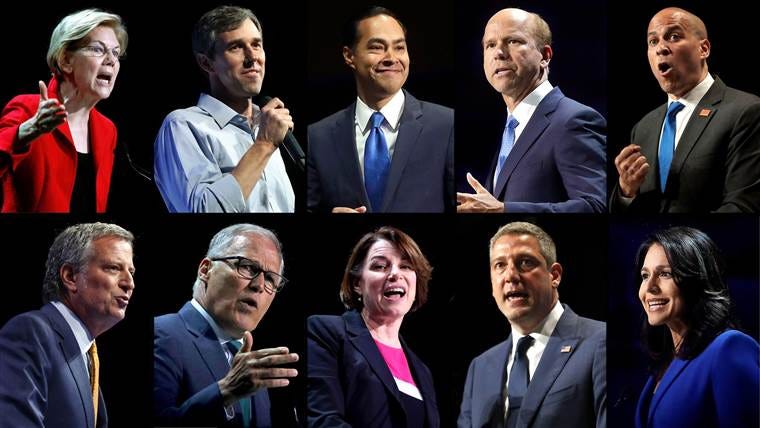Crowded Stage, Awkward Moderators & Noisy Twitter
Thoughts on Day 1 of the 2020 Democratic presidential debates
Publisher’s Riff

The first 2020 Democratic presidential primary stage was probably way too crowded, the moderators way too awkward and Twitter way too noisy for any one candidate to have a truly breakthrough moment. What it did do, however, is sharpen into focus who voters really want to see more of and who they don’t.
Hence, there wasn’t that much of a disruption to take notice of. There were certainly a few folks who suddenly caught brush fire or ‘broke out’ as was hyped, hoped for and expected. But, the conversation could easily be characterized as something not as kitchen table as we need it, but much more coffee table. Smart friends, perhaps lightly inebriated, quietly sizing each other up and casually throwing up clever catch-phrasing and data-points on the issues of the day. One or two on stage took a shot at breaking out of that, and misfired: from Tim Ryan reaching for “working class” Brawny sentimentalism to Amy Klobuchar’s “hunting and fishing” nostalgia.
What was evident was a permanence to Beto O’Rourke’s fall, who really should just go back to winning a Senate race or not come back at all. Julian Castro’s serious-as-a-heart-attack persona paid big dividends tonight as he swung and cut through a fog of comically pacifying Spanish from non-Spanish folks. Bill deBlasio, unbeknownst to all, was announcing his bid for Democratic National Committee Chair. Tulsi Gabbard is clearly putting in an audition tape for Secretary of Defense, whether it’s a new Democratic administration or the current Republican one stays.
What did take shape, too, was Cory Booker finally taking breaths early on. Someone told him to slow down and he listened. That crafted a near-credible bout against Elizabeth Warren, who kicked off strong first half and then seemed to fall back into the shade a little by second half. Tonight smelled very much Warren vs. Booker, but there was Castro jumping around, pounding gloves, on the edges of the ring.
Surprisingly - outrageously - voting rights, voter suppression and election security didn’t come up, as much as the democracy-destroying threat looms large like Death Star over Rebel moon. O’Rourke mentioned it once. The moderators didn’t even bother with it.
But, candidates desperately grabbed for their definition of authenticity, using immigration as opposed to pocket-book issues in an effort to that result. Authenticity has been something redefined and radically altered since 2016, candidates stumble around to show who’s really genuine: Who could be the most ‘culturally competent?’ Who could speak the better Spanish? And who cracked a better flow on ‘top 1% vs bottom 99%’ one-liners.
Clearly, the kids were left out of the conversation. It was a very 45+ conversation void of any serious talk about the state of K-12 - save John Delaney giving it honorable mention - until it touched on school shootings. Climate change was only urgent to Jay Inslee, and to the rest it was just getting checked off on a list of things to do. Donald Trump was barely mentioned up until the end (which explains his description of it as “boring”). Still, the questions and many of the answers were dominated by his priorities.
But, what seemed to change, was a conversation showing a quick whiff of much more visibly moderate, maybe scent of center-rightness contrasting the progressive, hard-left characterizations. This wasn’t anywhere near a “democratic socialist” conversation. Candidates were reaching for the general election. Yet, there was a strangely comfortable pivot away from the dominant Black voter discourse and protestations (save quick mentions and shout outs) that have dictated much of the cycle debate. They definitely sat there last night, packed into informal living room focus groups, and wondered out loud: “ummm, what about us?”
check out the latest B|E Note paid subscription analysis …



